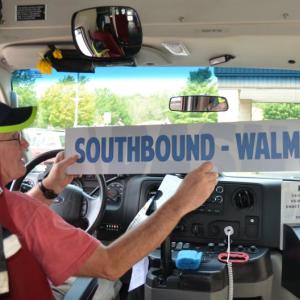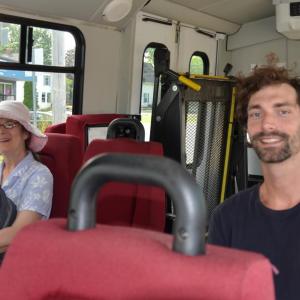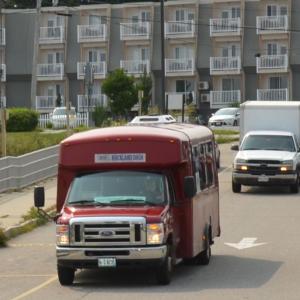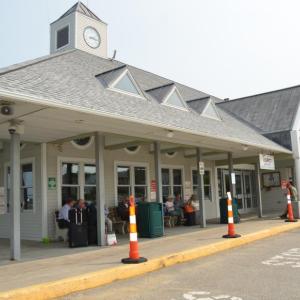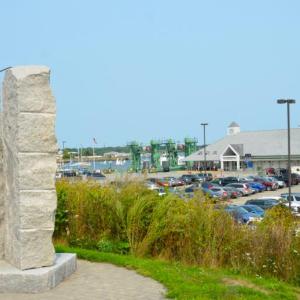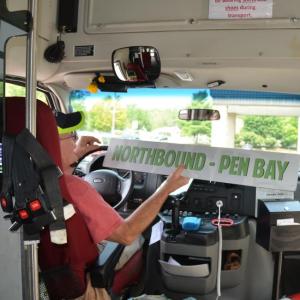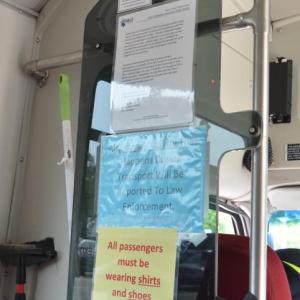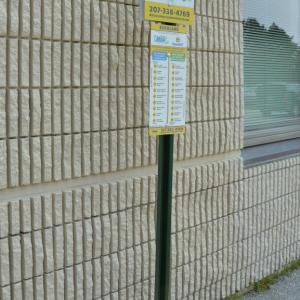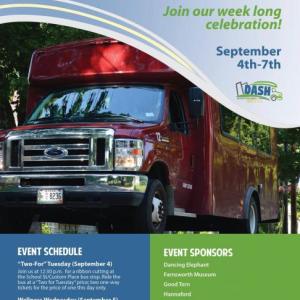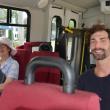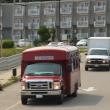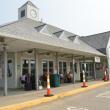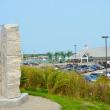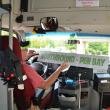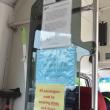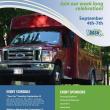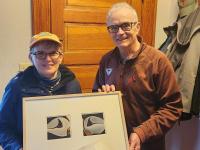Midcoast DASH bus makes tracks, with an eye on expanding
 Mike Ray flips the sign that rides in the DASH bus window, letting passengers know that he is heading to Walmart in Thomaston, or back to Pen Bay Medical Center in Rockport. (Photo by Lynda Clancy)
Mike Ray flips the sign that rides in the DASH bus window, letting passengers know that he is heading to Walmart in Thomaston, or back to Pen Bay Medical Center in Rockport. (Photo by Lynda Clancy)
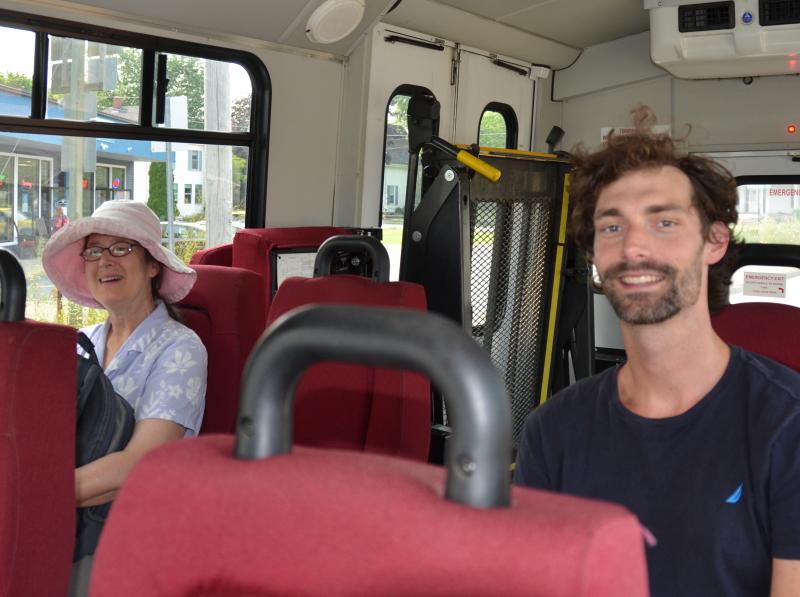 Susan Beebe and Ricky Malo got on the bus in Rockland and rode it up the road to Pen Bay Medical Center. (Photo by Lynda Clancy)
Susan Beebe and Ricky Malo got on the bus in Rockland and rode it up the road to Pen Bay Medical Center. (Photo by Lynda Clancy)
 The DASH arrives at the Rockland Ferry Terminal. (Photo by Lynda Clancy)
The DASH arrives at the Rockland Ferry Terminal. (Photo by Lynda Clancy)
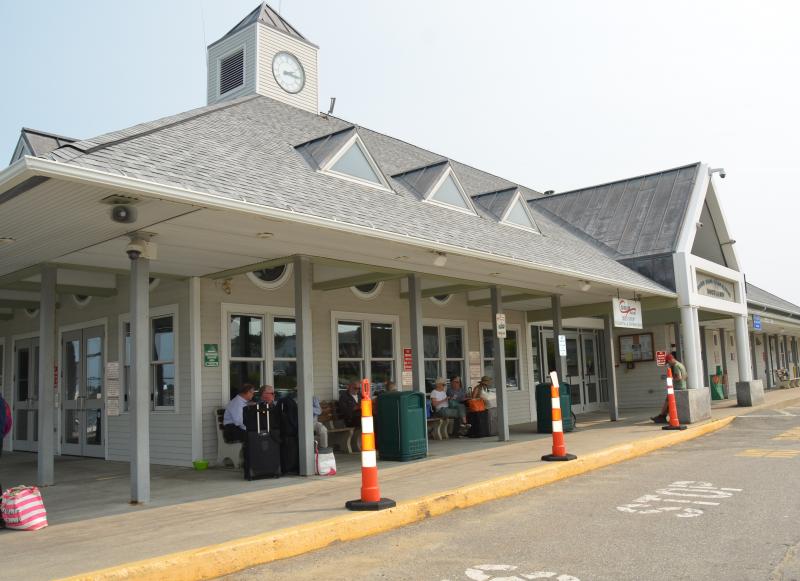 The stop at the Rockland Ferry Terminal.
The stop at the Rockland Ferry Terminal.
 Rockland Ferry Terminal.
Rockland Ferry Terminal.
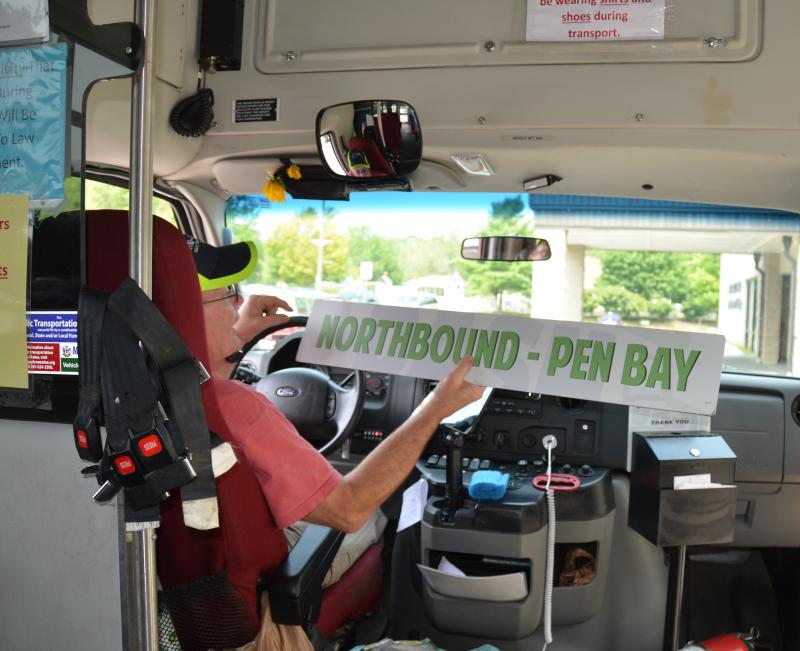 Heading north again.
Heading north again.
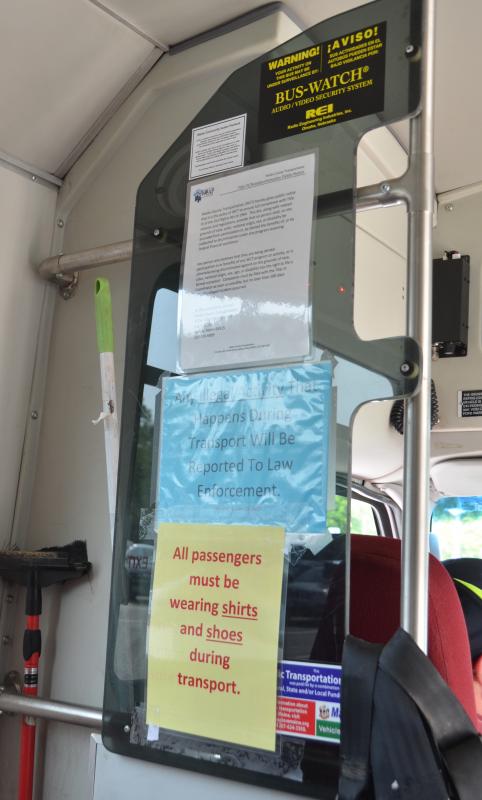
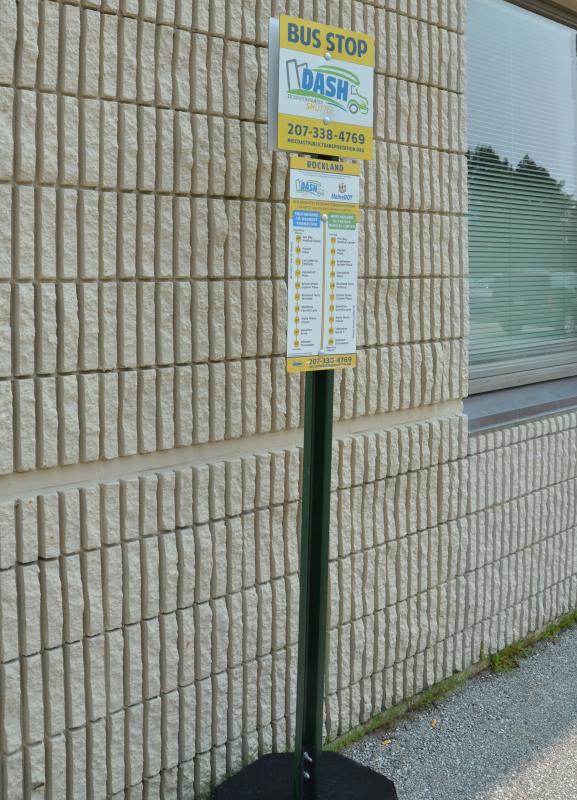
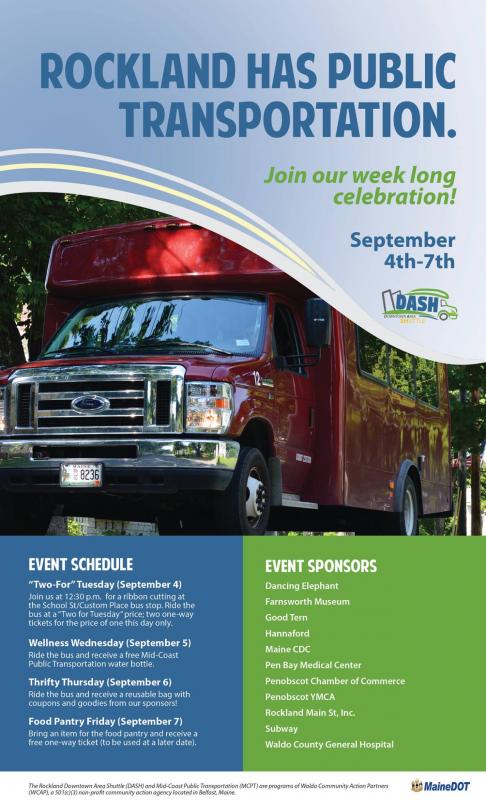
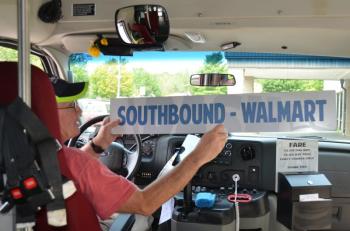 Mike Ray flips the sign that rides in the DASH bus window, letting passengers know that he is heading to Walmart in Thomaston, or back to Pen Bay Medical Center in Rockport. (Photo by Lynda Clancy)
Mike Ray flips the sign that rides in the DASH bus window, letting passengers know that he is heading to Walmart in Thomaston, or back to Pen Bay Medical Center in Rockport. (Photo by Lynda Clancy)
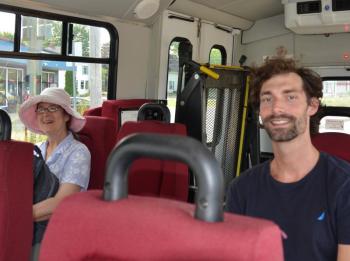 Susan Beebe and Ricky Malo got on the bus in Rockland and rode it up the road to Pen Bay Medical Center. (Photo by Lynda Clancy)
Susan Beebe and Ricky Malo got on the bus in Rockland and rode it up the road to Pen Bay Medical Center. (Photo by Lynda Clancy)
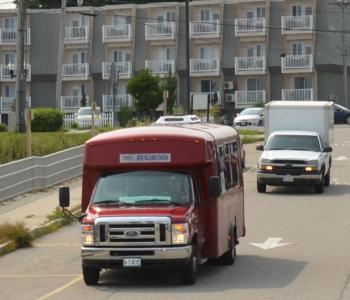 The DASH arrives at the Rockland Ferry Terminal. (Photo by Lynda Clancy)
The DASH arrives at the Rockland Ferry Terminal. (Photo by Lynda Clancy)
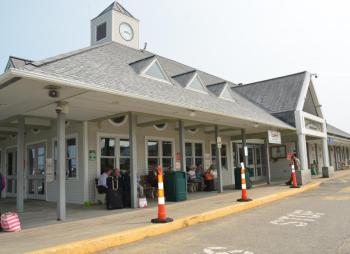 The stop at the Rockland Ferry Terminal.
The stop at the Rockland Ferry Terminal.
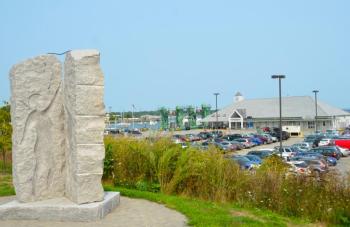 Rockland Ferry Terminal.
Rockland Ferry Terminal.
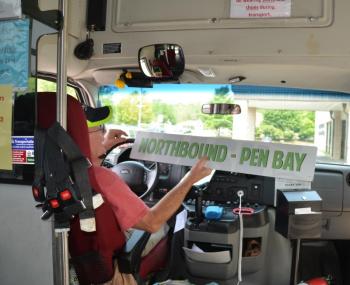 Heading north again.
Heading north again.
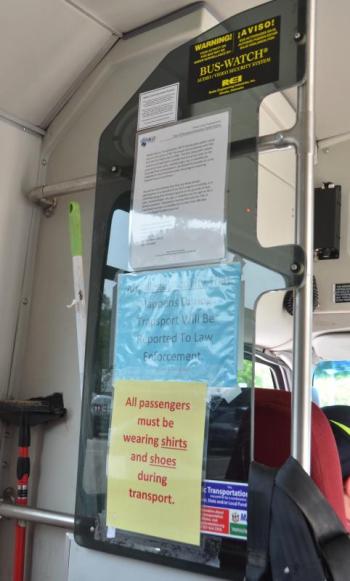
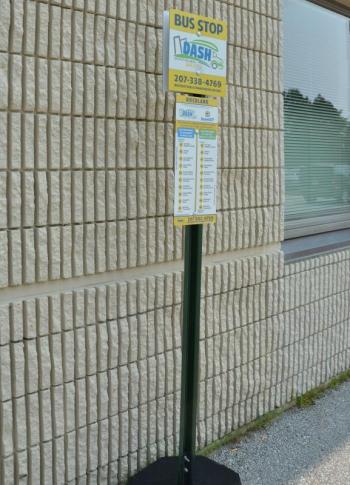
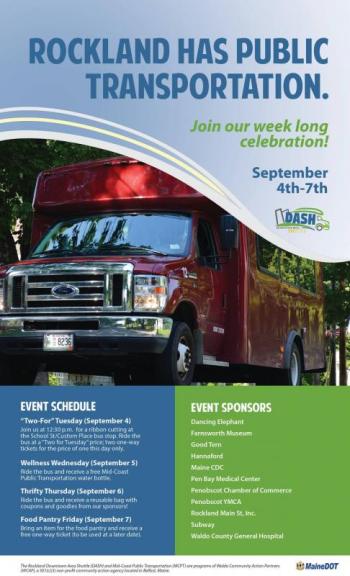
MIDCOAST — On a warm August afternoon, Susan Beebe sat by the window of the red DASH bus as it edged around Rockland’s North End, chatting with Ricky Malo. They were both headed to Pen Bay Medical Center, in Rockport; Beebe to visit her mother, who was recuperating in the hospital, and Malo to work a shift in the emergency room.
Beebe is an artist who lives in Rockland. She boarded the Dash at Custom Place, near the Rockland Post Office. She does not own a car, nor does she she drive, and the DASH provided a way to get five miles up the road, without having to ask a friend for a ride, or walking.
Malo, who has been living in Rockland for a year with his wife — both of them working at Pen Bay — was on the bus so he could get to work.
Up a few seats, a young woman was lost in her own thoughts, snugly tucked in privacy beneath earbuds.
For the first time in decades, public transportation along the well-traveled highway of Route 1 in Midcoast Maine had again become an option for people to get to their destinations. The DASH is an acronym for the Downtown Area Shuttle but its organizers have visions of expanding to connect communities.
“It’s a good start and I know it’s a pilot program,” said Beebe. “But it we can get some cars off the road, that’s great, too. I hope it goes further, up to Camden and down to Thomaston.”
Malo and his wife had moved to the Midcoast from Boston, after exploring the U.S. to find a nice area to in which to put down roots. From the Oregon coast to Maine, they finally settled on Rockland, got jobs at the local hospital, and are in process of buying a house.
“I know this area is growing,” he said, and while he rides his bike to work in good weather, the DASH is available for alternative transportation.
“It’s convenient for everybody, but so necessary for many,” he said.
Another woman on the southbound DASH that day had been visiting her doctor. She had moved to Maine from Pennsylvania and had little extra income, but she wanted to get her teeth fixed. So she rides the DASH three times a week to the doctor’s office.
“If it weren’t for this bus, I’d have to spend money on taxis, and I wouldn’t be able to get my teeth fixed and send money to my son,” who, she said, was trying to flee the California wildfires.
Community development leads to economic development
The Dash is a new public shuttle that has developed from a sturdy social service network. MidCoast Public Transportation is an initiative of the Waldo Community Action Partners, based in Belfast, which has served Waldo County since 1965.
For many years, Midcoast Public Transportation has provided rides for those who cannot drive, who are ill or disabled, or elderly, to medical appointments and stores for errands and shopping. Funding for the free transportation began in 1971 for the elderly in Waldo County.
At that point, the fleet included two vans, with service once a week to Waterville, Bangor and Belfast.
In the 1980s, WaldoCAP Transportation picked up a contract from the Maine Department of Human Services. In 2014, WCAP introduced its Md-Cost Connector for Maine Care, for Knox, Waldo, Lincoln and Sagadohoc counties.
In 2017, WaldoCAP leaders began brainstorming about expanding its role to include the broader public with a transportation system, and created an advisory group.
Their thoughts focused not just on social services, but grew to encompass economic health of region.
“Community development leads to economic development,” said Steffanie Pyle, who is community engagement facilitator for Midcoast Public Transportation.
Pyle and Gordon Page, director of Rockland Maine Street, a nonprofit that focuses on the economic and cultural vitality of downtown Rockland, talked about the evolution of the DASH as they rolled out a preview of the Sept. 4-7 celebration of “Rockland Has Public Transportation.”
Waldo CAP and its program, Midcoast Public Transportation, took a leap earlier this year by establishing the DASH, and in effect, moving into the public transportation business.
The Maine Department of Transportation endorsed the move, and is investing public dollars to fund it.
Grants derive from federal transportation funding for rural areas with populations of less than 50,000. The federal share of the grants is 80 percent for capital projects and 50 percent for operation costs.
Waldo CAP is required to provide matching funds, which, at this point, comprise fare-box revenue, grants for direct services (payment for the ride itself), town funding, and donations.
“We meet a need and provide a service,” said Pyle.
Both Page and Pyle focused on core factors that have been shaping Maine’s economy: Its aging population and the exodus of younger adults from the state.
Both population sectors face similar issues, such as lack of housing, little public transportation, and jobs. The elderly often want to remain at home, but they lose their ability to drive. Young adults can’t afford a car.
Maine’s economy relies on adults who drive to work, sometimes commuting long distances. And when a citizen loses the ability to drive, whether caused by vehicle breakdown, revoked license or injury, then a paycheck is lost from a household, and the broader community loses, as well, as that household’s purchasing power is diminished.
How to change that? Get a bus going to the various service centers in the Midcoast.
“Good public transportation is an excellent way to help both the old and young,” said Pyle.
Changing the Narrative
In the early part of the last century, Midcoast residents rode the electric train from Thomaston, through Rockland, Rockland and to Camden. In the 1960s, they rode a bus up and down Route 1. Then, public transportation halted and it became the age of the car.
That is slowly changing again and Waldo CAP has recognized a growing demand for a bus service. Last year, the Islesboro Central School requested Waldo CAP to run a bus from the Lincolnville ferry terminal to Belfast to help transport magnet high school students to and from the ferry. A stop at the Wentworth Grocery Store in Northport was added, and now the bus is a popular run for many in the general public.
A similar need is growing in Rockland where students coming off the island ferries need to get up the road to UMA Rockland Center, the Midcoast university center for UMaine Augusta. The DASH stops at the Rockland ferry terminal and at the Breakwater Building, where the Rockland Center is located.
And, there are ongoing talks for more routes and stops.
The Midcoast Public Transportation fact sheet says: “This is one piece of starting to link communities in Region 5,” so named by the DOT and encompasses a wider geography along the Midcoast.
The transportation advisory group meets the third Tuesday of each month, and the gatherings are open to the public. Click here for the Facebook page.
Next on the list is possibly extending the bus service to Rockport and Camden, and perhaps even to Belfast.
Camden and Rockport are “the big hole,” said Pyle.
Currently, two DASH buses run daily between Pen Bay Medical Center and Walmart, in Thomaston, with various stops in between. Another DASH operates in Belfast, making a series of stops throughout that small city.
For Mike Ray, a Lincolnville resident and driver of the DASH and other Midcoast Transportation vehicles (from buses to vans to Priuses), the route through from the southern end of Rockport to the northern end of Thomaston is full of interesting people, and there are already many regular passengers he sees.
“I’m cautiously optimistic,” he said, about the new service. “People can save money and make it can make life easier.”
And, like Beebe, he has witnessed an increase of local traffic.
“Maybe this will cut down on some of the Rockland craziness,” he said. “Belfast is getting a little congested, too.”
And for the woman who has to make the decision of where to spend her money, the bus is simply, “excellent.”
The weeklong celebration, Dash Splash Week, begins Sept. 4 with a 12:30 p.m ribbon cutting at the School Street/Custom Place bus stop, and follows with giveaways, discounts, and more.
The schedule follows:
Sept. 4, Two for Tuesday and Ribbon Cutting, a ribbon cutting at 12:30 p.m. at the School St./Custom Place bus stop. Ride the bus at two for the price of one.
September 5, Wellness Wednesday, ride the bus and receive a free water bottle and information on health and wellness.
September 6, Thrifty Thursday, ride the bus and receive a re-usable grocery bag with coupons and goodies from sponsors.
September 7, Food Pantry Friday, give back to the community. Take an item for the food pantry when you ride the bus and receive a free one-way ticket for later use.
Supporters and sponsors of DASH Splash week include:
- Maine DOT
- The Dancing Elephant
- The Farnsworth Museum
- Good Tern Co-op
- Hannaford
- Maine CDC
- Pen Bay Medical Center/Waldo County General Hospital
- Penobscot Chamber of Commerce
- Penobscot YMCA
- Rockland Main St., Inc.
- Subway
The fixed route consists of eight stops between Walmart and PBMC, between 7 a.m. and 4:50 p.m., Monday through Friday, from both locations. Currently, fares are listed as $2 per boarding, $5 for a day pass, $20 for a 12-punch ticket, and $50 for a monthly pass. Senior and youth discounts are available. To purchase tickets, call (207) 338-4769.
Event Date
Address
United States

